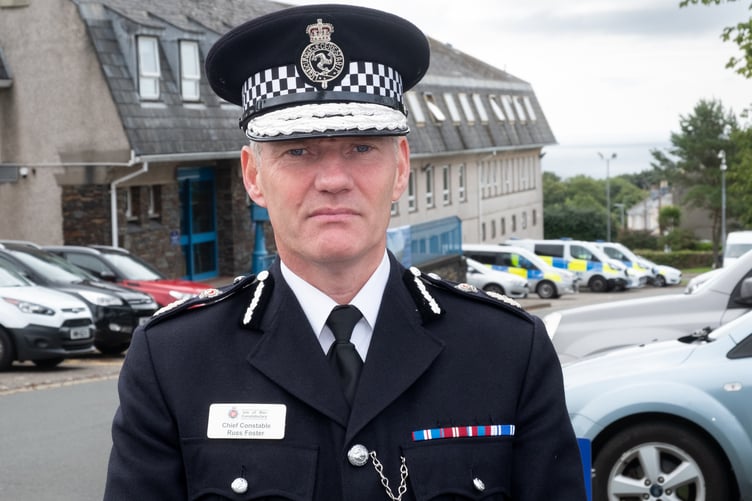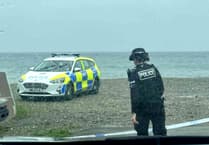There are no fewer than 10 active police investigations currently under way into international money laundering, the Isle of Man Constabulary’s Chief Constable has confirmed.
In his latest annual report, Russ Foster revealed that some £300m of finances had been frozen as part of the ongoing operations which have seen multiple raids and arrests.
He said a majority of cases involved the e-gaming sector, and organised criminals, predominantly from South East Asia, have managed to get a ‘foot hold’ in the Isle of Man, laundering money through illegitimate businesses.
The Chief Constable’s annual report for the year 2024-25, which is set to be laid before the July Tynwald, shows that there was a 10% reduction in overall recorded crime in the island during the year.
But Mr Foster said the challenge for policing is becoming ‘increasingly complex’ with various forms of organised criminality, money laundering and the work being undertaken to tackle violence against woman and girls.
In his overview, he said that the Isle of Man Constabulary has established a fully functioning Proactive International Money Laundering Investigation Team (PIMLIT).
He said: ‘Investigations over the last year have doubled, increasing to 10 active international money laundering cases, where the predicate criminal activity occurs outside the Isle of Man, but with large-scale proceeds flowing through the island's financial system.
‘The PIMLIT, supported by the wider IOMC, has conducted three major multi-agency operations this year, which included assistance from the Financial Intelligence Unit, Customs, Immigration, and the island’s regulators.
‘These ongoing operations have culminated in the execution of multiple warrants, premises searches and arrests, along with the seizure of large volumes of physical and digital evidence, as well as financial restraints of approximately £300m.’
PIMLIT’s headcount now stands at 31 with three more to be appointed thanks to extra funding from the seized asset fund.
Across the Force, the overall volume of current active money laundering cases stands at 69 live investigations with a detection rate of 60%.
The report says the international money laundering cases under investigation are complex and include multi-jurisdictional structures and the use of shell companies to hide criminal proceeds.
There has been a notable increase in the use of cryptocurrency to move illicit funds as part of the laundering process. During the year $1.2m in cryptocurrency was seized.
It is clear, notes the report, that transnational organised crime continues to be a ‘prevailing threat’ to the Isle of Man as an international finance centre, as well as ‘our porous borders’ and the ‘exploitation of our immigration processes’.
Vulnerabilities in the immigration system have been exploited by organised crime groups (OCGs) involved in human trafficking and modern day slavery, it adds.
And in a section on strategic threats and risks, the Chief Constable does not hold back in his criticism of political decision makers.
He said it was ‘disappointing’ that areas graded as ‘high’ risk attracted no funding at all, as it was a ‘political’ judgement call.
The Chief Constable said he is concerned that this basis was ‘flawed’ and in the ‘event of a catastrophe occurring, such rationale would not withstand scrutiny at any subsequent inquiry / legal proceedings’.
One risk identified as ‘high’ related to a request for more specialist staff in the Digital Evidence Unit, which was declined by the Isle of Man Government, a decision that risked vulnerable victims of crime being ‘let down’.
The Chief Constable said the police continue to effectively target organised crime - and 39% of prisoners currently detained in the Isle of Man Prison in Jurby are linked to such groups.
But the activities of OCGs have suffered major disruption due to operations codenamed Vineyard, Voodoo, Tirana, Dubrovnik, Monsoon, Yankee, Impala and Rigel.
Mr Foster said 37 local and 22 UK-based individuals had been arrested during the year for various offences, including drug importation, money laundering, and serious fraud.
Collectively, the operations have seen some 4.5 kilos of cocaine seized with a street value of £464,000, 14.5 kilos of cannabis valued at £250,000, and 1.5 kilos of ketamine valued at £75,000.
Criminal property worth £127,000 has also been seized in relation to these operations.
There was a 25% increase in the number of rape offences reported in the year and a 24% increase for sexual offences excluding rape.
The detection rate for rape investigations rose from 21% to 28%, with several lengthy prison sentences being imposed by the court but the detection rate for non-rape sexual offences decreased from 50% to 44%.
Overall, the detection rate for crime was 56%, up 2% increase from last year, which Mr Foster described as ‘exceptional compared to other forces in the UK and other similar jurisdictions’.
A successful recruitment campaign attracted 16 new officers who complete their initial training in April, but the Chief Constable said the 30 vacancies carried up to that point had made it a tough year.
Staff recruitment and retention issues and competing demands have ‘denuded’ the capability and capacity of neighbourhood policing, the report states.
On occasions, it has been challenging for police to cover an emergency response for the full range of shifts, it reveals.



.jpeg?width=209&height=140&crop=209:145,smart&quality=75)